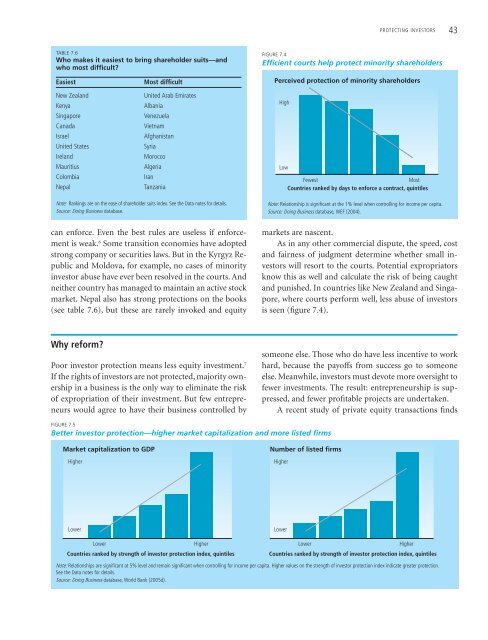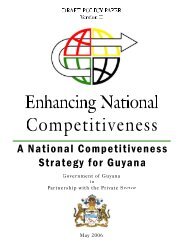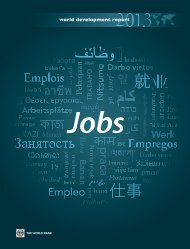Creating
Doing Business in 2006 -- Creating Jobs - Caribbean Elections
Doing Business in 2006 -- Creating Jobs - Caribbean Elections
You also want an ePaper? Increase the reach of your titles
YUMPU automatically turns print PDFs into web optimized ePapers that Google loves.
PROTECTING INVESTORS 43<br />
TABLE 7.6<br />
Who makes it easiest to bring shareholder suits—and<br />
who most difficult?<br />
<br />
<br />
Easiest<br />
New Zealand<br />
Kenya<br />
Singapore<br />
Canada<br />
Israel<br />
United States<br />
Ireland<br />
Mauritius<br />
Colombia<br />
Nepal<br />
Most difficult<br />
United Arab Emirates<br />
Albania<br />
Venezuela<br />
Vietnam<br />
Afghanistan<br />
Syria<br />
Morocco<br />
Algeria<br />
Iran<br />
Tanzania<br />
<br />
<br />
<br />
<br />
<br />
<br />
Note: Rankings are on the ease of shareholder suits index. See the Data notes for details.<br />
Source: Doing Business database.<br />
<br />
<br />
can enforce. Even the best rules are useless if enforcement<br />
is weak. 6 Some transition economies have adopted<br />
strong company or securities laws. But in the Kyrgyz Republic<br />
and Moldova, for example, no cases of minority<br />
investor abuse have ever been resolved in the courts. And<br />
neither country has managed to maintain an active stock<br />
market. Nepal also has strong protections on the books<br />
(see table 7.6), but these are rarely invoked and equity<br />
markets are nascent.<br />
As in any other commercial dispute, the speed, cost<br />
and fairness of judgment determine whether small investors<br />
will resort to the courts. Potential expropriators<br />
know this as well and calculate the risk of being caught<br />
and punished. In countries like New Zealand and Singapore,<br />
where courts perform well, less abuse of investors<br />
is seen (figure 7.4).<br />
Why reform?<br />
Poor investor protection means less equity investment. 7<br />
If the rights of investors are not protected, majority ownership<br />
in a business is the only way to eliminate the risk<br />
of expropriation of their investment. But few entrepreneurs<br />
would agree to have their business controlled by<br />
someone else. Those who do have less incentive to work<br />
hard, because the payoffs from success go to someone<br />
else. Meanwhile, investors must devote more oversight to<br />
fewer investments. The result: entrepreneurship is suppressed,<br />
and fewer profitable projects are undertaken.<br />
A recent study of private equity transactions finds

















